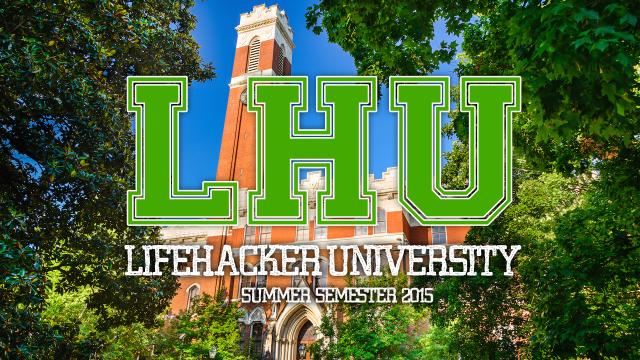Your education doesn’t have to stop once you leave school — freedom from the classroom just means you have more control over what you learn and when you learn it. We’ve put together a curriculum of some of the best free online classes available on the web for the latest edition of Lifehacker U, our regularly updating guide to improving your life with free, online university-level classes. Let’s get started.
Studying picture from Shutterstock
Orientation: What Is Lifehacker U?
Whether you’re a graduate, a full-time worker, a retiree or just someone with a passion for learning, there are loads of great courses online. Anyone with a little time and a passion for self-growth (and a computer) can “enrol” in these courses for their own personal benefit.
Institutions like Yale University, MIT, Stanford, Monash, Macquarie and many more are all offering free online classes that you can participate in from the comfort of your dorm room, office, couch or computing chair-of-choice.
Because we’re all about helping you improve your life at Lifehacker, we put together a list of courses available right now that will inspire you, challenge you, open the door to something new, and give you the tools to improve your life. Grab your pen and paper and make sure your battery is charged — class is in session!
Computer Science And Technology

- Harvard University – CS50: Introduction to Computer Science – Professors David J. Malan, Rob Bowden, Zamyla Chan and Allison Buchholtz-Au – Harvard’s CS50 is the class the computer science majors start with when they arrive in their first year, and you can sign up to take it online, for free. If you pay, you can even get a certificate once you’ve completed the course. You’ll learn the basics of computer programming, how computers “think” and interpret language, how to think algorithmically and solve problems, and the basics of data security and encapsulation. By the time you’re finished, you’ll be familiar with languages like C/C++, JavaScript and PHP, and you’ll have dabbled in SQL, CSS and HTML.
- Harvey Mudd College – MyCS: Computer Science for Beginners – Professor Zachary Dodds: If you’re interested in a free, online course to get kids involved with computer science, learning to code, or just familiar with how computer programs work, this is a great choice. It’s also a good option for adults who don’t have an extensive computer or technology background Topics include how computer store and retrieve information, and how computers “think,” and you’ll play with Scratch, the programming language, to solve problems.
- Udacity – Intro to iOS App Development with Swift – Professor Kunal Chawla: If you’re interested in app development and iOS is your preferred platform, this free course is a good place to start. You’ll need some programming experience to make the most of it, but you don’t need to know Swift or be that familiar with iOS app development to master it. You will need a Mac (running OS X 10.10) and an iOS device. By the end of the course you’ll have built an app that can record you and a friend’s voices, play them back, and then modulate your voices to sound like chipmunks or Darth Vader. You’ll have a working knowledge of Swift, enough to get your own app idea off the ground.
- Udacity – Developing Android Apps – Professors Rito Meier, Katherine Kuan, Dan Galpin, Alexander Lucas, Sarah Spikes, and James Williams: If your preferred mobile app platform is Android, this course in developing apps is a good option. Again, you’ll need some programming fundamentals to get the most out of the course, you’ll need to grab Android Studio, and be ready to learn how to use GitHub to post, fork, and manage code. You’ll build an internet-connected Android app that will show you the fundamentals of Android permissions, creating a user interface for Android devices, and learn enough to start building your own Android apps after the class is over. The self-paced version of the course is free. If you pay for the course, you’ll get group projects and instructor-led activities.
- University of Washington – Computational Neuroscience – Professors Rajesh P. N. Nao and Adrienne Fairhall: There’s more to computer science than just learning to code, and this course in computational neuroscience aims to explore some of those concepts. You’ll learn about how to model systems to emulate human thinking patterns and structures, and you’ll study the basic computational methods that describe what nervous systems do and how they function. If you’ve ever wondered how computers are like neurons, this is the course for you. Some maths background would be useful.
- France Universite Numerique – Code-Based Cryptography – Professors Irene Marquez-Corbella, Nicolas Sendrier, and Matthieu Finiasz – If you’re curious how cryptography really works, or how the future of information security will evolve with newer, faster, and more complex computing systems, this class will give you a head start on the topic. This is an advanced course, and is designed for people who are moving past their undergraduate studies in computer science and information architecture.
- Rice – An Introduction to Interactive Programming in Python (Part I) – Professors Joe Warren, Scott Rixner, John Greiner, and Stephen Wong – Python is a great programming language for beginners, and this course from Rice will show you the ins and outs of the language, how to build good coding habits with Python, and how to start building your own utilities and applications. You’ll work through multiple mini-projects in Python, learning new skills as you progress. It’s a fun way to learn a new language, but it’s a two-parter. Keep an eye out for Part II, starting later this year, if you sign up for this one.
- University of Reading – Begin Robotics – Professors Richard Mitchell, Tharindu Liyanagunawardena, and William Harwin: Learning about robots was never this much fun. This course is a basic introduction to robotics that examines how robots “think” and “learn,” how they process information, how we interact with and program robots, and a look back at the history of robots and robotics from science fiction to science fact.
Finance and Economics

- University of Michigan – Introduction to Finance – Professor Gautam Kaul: If your interests in finance are less “personal finance” and more economic in nature, this course is a good starting point. It blends the two topics well, and helps you learn to think of finance as more than just balancing books and paying off debt. It covers supply and demand and the large-scale movements of money and debt that drive massive projects, businesses and entire economies.
- Barnard College – Economics of Money and Banking, Part One – Professor Perry J Mehrling: This course in economics and banking explores new ideas and concepts in borrowing, lending, and banking in general based on some old traditions in economics that have been left by the wayside over the years. With one foot firmly planted in the financial crisis of 2007-2009, the course will look at ways to solve the systemic problems unveiled at that time for the long term, and discuss ideas for how to make a more robust and equitable financial system overall.
Science And Medicine

- The University of Edinburgh – AstroTech: The Science and Technology Behind Astronomical Discovery – Professor Andy Lawrence and Catherine Heymans: This course will take you on a tour of some of humanity’s best techniqyes instruments for looking at the universe: what they do, how they work, and the science that’s used by the real people who operate them. You’ll hunt for black holes, look at distant galaxies, reach all the way back to the beginnings of the universe, and study the tools that pave the way for future discoveries.
- Harvard University – Fundamentals of Neuroscience, Part I – Professors David Cox, Winston Yan, and Nadja Oertelt: What do we know about how our minds work? You’ll learn how the brain processes information from the body, from the inner microscopic workings of nerve cells to how entire parts of the brain work in concert. The course is free and open to everyone, but you have to register through EdX if you want a certificate.
- University of Michigan – Introduction to Thermodynamics: Transferring Energy from Here to There – Professor Margaret Wooldridge, Ph.D.: The Laws of Thermodynamics are more than just physical principles — they explain why perpetual motion machines don’t work, why cold fusion isn’t a thing, and why you can’t just create limitless energy from nothing. This course is a primer in thermodynamics and mass and energy conservation principles. You’ll need some basic science and maths (physics, algebra and maybe calculus) to get the most out of the course.
- The University of Groningen – Why Do We Age? The Molecular Mechanisms of Ageing – Professor Marianna Bevova: Is there a limit to the human lifespan? Why do we age, and what signals the beginning of the process? This course investigates the recent advances in age-related studies and the never-ending human quest for immortality. You’ll hear from biology lecturers studying the ageing process, as well as learn about the cell systems, animal models and computational models used to explore the topic.
- Dartmouth University – The Engineering of Structures Around Us – Professors Vicki May, Adrienne Gauther, Jay Beaudoin, Sawyer Broadley, Owl*, Meegan Daigler, Katherine Franklin, Jenny Seong, Ariana Sopher, Laura Vang, Jared Benedict, Michael Goudzwaard, Petra Bonfert-Taylor, Janifer Holt, Katherine Roy and David Souther: If you’ve ever wondered how bridges stay up, how massive apartment buildings stay up without collapasing, or even how bridges and buildings collapse when they do fail, this is the class for you. You’ll come away with an understanding of how engineers put structures together to support themselves and any additional weight needed, and how those principles mesh with design and making those same structures pleasing to the eye.
- The European Space Agency (ESA) – Monitoring Climate from Space – Professors Martin Wooster, Andrew Shepherd, and Mathias Disney: Some of the best information we have about the Earth’s changing climate — and what’s causing it — comes from near-earth satellites, our outposts in space. In this course from the ESA, you’ll study those orbital platforms and the information they collect and relay to scientists on the ground, how accurate they are, and how important it is to continue monitoring our home from space.
- University of California San Diego – Finding Hidden Messages in DNA – Professors Pavel Pevzner and Phillip E. C. Compau: This course will help you understand how DNA can tell us whether we’ll get a specific illness, how DNA replicates itself, how DNA expression works, and how those “hidden messages” translate into basic organic functions.
- Rice University – Medicine in the Digital Age – Professors Kirsten Ostherr and Bryan Vartabedian, MD: Patients have more options than ever to track their own health. How can we expect technology to keep making strides in this area? This course will walk you through some of the recent developments in healthcare technology, how that technology is redefining who the physician really is and the tools they rely on for diagnosis, and how to critically analyse the risks and rewards of technology in the healthcare marketplace.
- The University of New South Wales – Myths and Realities of Personalised Medicine: The Genetic Revolution – Professors Dr Caroline Ford, Dr Orin Chisholm, Dr Sheri Nixdorf, and Rachel Williams: There was a time when people thought that the “generic revolution” would lead to drugs developed specifically for individuals, customised for each person. Where does understanding genetics and genome really help people with everyday health care? This course will help you understand where the real advances have taken place.
Mathematics

- University of Notre Dame – Maths in Sports – Professors Anne Pilkington and Michael Hildreth: Understanding mathematics can be daunting when your only real application for it is solving problems in classrooms. This course will show you how mathematical principles play out in your favourite sports, from how to draw conclusions using inductive reasoning to simple scoring methods and probability analysis.
- Tsinghua University – Combinatorial Mathematics – Professor Yuchun Ma: If you’ve ever rolled the dice and wondered what the odds you’d get a certain number two or three times was, you’ve thought about combinatorial mathematics. This course will walk you through how to make those judgements and do those calculations. You’ll study pigeonhole principles, recurring numbers like the Fibonacci Sequence, functions and more.
- Udacity – Differential Equations in Action – Professors Jörn Loviscach and Miriam Swords Kalk – Understanding differential equations is crucial for computer programming and higher sciences, and this Udacity course will walk you through the topic with an emphasis on what you need to know for computing principles. You’ll see how differential equations play a role in real world studies and calculations, starting with the maths needed to rescue the Apollo 13 mission.
Social Sciences, Classics, and Humanities

- Smithsonian Institution – The Rise of Superheroes and Their Impact on Pop Culture – Professors Stan Lee, Michael Uslan, David Uslan, and Dr. Christopher Robichaud: One of our favourite recurring courses is back: the Smithsonian’s crash course on superheroes. This covers how the mythos of the modern day superhero came to be, how they have changed culture forever, and how they have evolved from poster children of high morality to conflicted, relatable personalities with internal struggles and powerful enemies. You’ll look back at ancient gods and myths of Egypt, Rome and Greece, and see how their archetypes are still with us today.
- University of Michigan – Fantasy and Science Fiction: The Human Mind, Our Modern World – Professor Eric Rabkin: This class examines topics commonly approached in science fiction and fantasy, and how those genres often say more about the time and places in which they were written than they could ever say about the futures they imagine. You’ll study fantasy and sci-fi books both old and new, like Frankenstein and The Martian Chronicles to understand some of the underlying themes that still resonate with readers today.
- Universitat Autonoma de Barcelona – Emotions: A Philosophical Introduction – Professor Jordi Vallverdú: What are emotions, and why do we feel them? Why are they so important to us? This course aims to take a more human approach to the topic, and to help us understand how our emotions are shared experiences across cultures and generations. The course dives into the evolutionary and scientific basis for emotional response, but aims to approach those topics from a philosophical perspective.
- The Hans Christian Andersen Centre – Hans Christian Andersen’s Fairy Tales – Professors Ivy York Möller-Christensen, Jacob Bøggild, Johannes Nørregaard Frandsen and Torsten Bøgh Thomsen – These aren’t your Disney fairy tales — but they are the stories that inspired them. This free course by the Hans Christian Andersen Centre explores the original stories and fairy tales that taught children for generations how to behave, where their place in society was, and the values that helped raise them.
- Universitat de Barcelona – Magic In the Middle Ages – Professors Dr Noemí Alvarez da Silva, Godefroid de Callataÿ, Dr Pau Castell Granados, Sébastien Moureau, Dr Gemma Pellissa Prades and Delfi I. Nieto-Isabel: In the Middle Ages, many phenomena in the physical world that were poorly understood could only be explained by reference to “magic”. This course examines that topic, covering how people perceived what was “natural” and what was “magical” in the middle ages, and how some cultures embraced that magic while others decried it — sometimes violently.
- Australian National University – Ignorance! – Professors Michael Smithson and Gabriele Bammer: Ignorance is more than just the absence of knowledge. Where does this absence come from, and how is it defined? In this course you’ll study different kinds of ignorance, sources of ignorance, and the social roles, benefits and costs of ignorance.
- The University of Hong Kong – Humanity and Nature in Chinese Thought – Professor Chad Hansen: This course gives you the opportunity to study along with Chinese masters of philosophy as they search the natural world for clues as to where ethics originate. What is “ethical” behaviour? Where do ethics and values differ, and what does the natural world have to say about the things we consider “ethical?” This course follows two rival schools of thought in ancient China that both sought to understand and define what “ethical thought” and “ethical behaviour” really were, beyond a generic understanding of right and wrong.
Law

- Université Catholique de Louvain – International Law – Professor Pierre d’Argent: When people talk about “international law”, what do they mean? What body makes those globally understood “laws” and who presides over them? This course examines the topic, and who must respect those laws, how they’re applied, and how they’re enforced. You’ll focus on international bodies like the International Court of Justice, and the United Nations in the process.
- University of London – Freedom and Protest: Magna Carta and Its Legacies – Professors Dr Emm Johnstone, Dr Graham Smith, Justin Champion, Nigel Saul, and Jonathan Phillips – The Magna Carta, one of the bedrock documents for the western system of justice and self-governance, is 800 years old this year. This course takes a look back at the historic document, how it was groundbreaking in its day, and how its echoes still steer how people govern and are governed to this day.
Cross-Disciplinary Courses and Seminars

- The University of Adelaide – Cyberwar, Surveillance, and Security – Professors Melissa de Zwart, Dale Stephens, and Rebecca LeForgia: The Internet is both the ultimate tool for information sharing and communication, but it’s also becoming a massive monitoring and surveillance tool. This course dives into why, and how international agencies and organisations are using it to spy on others of interest, and use the information they collect.
- The University of Nottingham – Propaganda and Ideology in Everyday Life – Professors Maiken Umbach, Ian Cooke, and Matthew Humphrey: This course examines how propaganda plays a role in everyday life, what propaganda really looks like, and how ideology becomes the building blocks of our personal and political perspectives.
- The University of Southampton – Shipwrecks and Submerged Worlds: Maritime Archaeology – Professors Jon Adams, Dr Lucy Blue, Dr Helen Farr, Dr Jesse Ransley, Dr Fraser Sturt and Dr Julian Whitewright – Lurking beneath the waves is a treasure trove of information on our ancestors, how they travelled the globe, what they took with them, why they left home, and both the treasures and adventures they sought when they did. This course examines how archaeology below the surface of the water is conducted, the tools that divers and researchers use to find wrecks and lost ships, when they raise them and how they preserve them, and what they can learn even by looking through what’s sitting right there at the bottom of the ocean.
- Johns Hopkins University – Psychological First Aid – Professor George Everly, Jr., PhD: This course examines the RAPID model (Reflective listening, Assessment of needs, Prioritisation, Intervention, and Disposition) for providing psychological assistance to victims of trauma or other emotionally and physically jarring events. Over the course of the class, you’ll learn to put the model into practice in your own life, and how experts use it to provide assistance to people suffering from mental health illnesses or pressures.
- The Open University – Childhood in the Digital Age – Professor Nathalia Gjersoe: Today’s constantly-connected, technologically-dominated society presents particular challenges for children. What do all those changes mean to young people as they try to find their way in this new world, and how do tools like social media influence how children see and form relationships?
- The University of Notre Dame – Understanding Wireless: Technology, Economics, and Policy – Professors Patricia L. Bellia, Barry Patrick Keating, J. Nicholas Laneman, and Aaron Striegel: Why mobile networks are set up the way they are? Why are certain frequencies used for commercial purposes, and why is mobile bandwidth an issue? This course helps you truly understand wireless communication, from mobile devices and the crunch for wireless bandwidth across data providers, as well as how your own devices function and talk to each other in your own home.
- The University of Cape Town – What Is a Mind? – Professor Mark Solms: This course aims to introduce you to the many schools of thought around what makes up a “mind” and “how the mind works”. You’ll study neuroscience and medicine, consciousness, sensitivity and subjectivity, among other topics.
- Case Western Reserve University – Women in Leadership: Inspiring Positive Change – Professor Diana Bilimoria, PhD – This course aims to empower both women and men to create positive, inclusive workplaces, as well as engage in career development and learn how to take on leadership roles in both work and life. The course will tackle topics relating to women in the workplace and in leadership positions, address conscious and unconscious biases on the topic, and discuss the traits that lead to the success of women in the workplace.
Extra Credit: How To Find Your Own Online Classes
The curriculum at Lifehacker U is rich and deep, but it may not reflect all of your areas of interests or expertise. If you’re looking for more or more varied course material, here are some resources to help you find great, university-level online classes that you can take from the comfort of your desk, at any time of day.
- Academic Earth curates an amazing list of video seminars and classes from some of the world’s smartest minds, innovators and leaders on a variety of topics including science, mathematics, politics, public policy, art, history and more.
- TED talks are well known for being thought provoking, interesting, intelligent, and in many cases, inspiring and informative. We’ve featured TED talks at Lifehacker before, and if you’re looking for seminars on the web worth watching, TED is worth perusing.
- edX is a collection of free courses from leading Universities like the University of California, Berkeley, MIT and Harvard. There aren’t many, but the ones offered are free, open to the public, and they rotate often.
- Coursera has a broad selection of courses in-session or beginning shortly that you can take for academic credit (if you’re enrolled) or just a certificate of completion that shows you’ve learned a new skill. Topics range from science and technology to social science and humanities, and they’re all free.
- Udacity offers a slimmer selection of courses, but the ones offered are not only often for-credit, but they’re instructor led and geared towards specific goals, with skilled and talented instructors walking you through everything from building a startup to programming a robotic car.
- The Saylor Foundation offers a wide array of courses and entire course programs on topics from economics to political science and professional development. Interested in a crash course in mechanical engineering? The Saylor Foundation can help you with that.
- Class Central aggregates some of the best courses available from open universities and programs around the web in an easy to sort and search format. Just search for what you want to learn, and if a course is available and starting soon, you’ll find it.
- Education-Portal.com has a list of universities offering free and for-credit online classes to students and the public at large.
- CreateLIVE features a number of interactive courses in business, photography, and self-improvement, many of which are free and available to listen in on at any time of day.
- Open Culture‘s list of free online courses is broken down by subject matter and includes classes available on YouTube, iTunes U, and direct from the University or School’s website.
- The Open Courseware Consortium is a collection of colleges and universities that have all agreed to use a similar platform to offer seminars and full classes — complete with notes, memos, examinations, and other documentation free on the web. They also maintain a great list of member schools around the world, so you can visit universities anywhere in the world and take the online classes they make available.
- The Khan Academy offers free YouTube-based video classes in maths, science, technology, the humanities, and test preparation and study skills. If you’re looking to augment your education or just take a couple video classes in your spare time, it’s a great place to start and has a lot of interesting topics to offer.
- The University of Reddit is a crowd-built set of classes and seminars by Reddit users who have expertise to share. Topics range from computer science and programming to palaeontology, narrative poetry, and Latin. Individuals interested in teaching classes regularly post to the University of Reddit subthread to gauge interest in future courses and announce when new modules are available.
- The Lifehacker Night School is our own set of tutorials and classes that help you out with deep and intricate subjects like becoming a better photographer,building your own computer, or getting to know your network, among others.
The beautiful thing about taking classes online is that you can pick and choose the classes you want to attend, skip lectures and come back to them later (in some cases — some classes require your regular attendance and participation!), and do examinations and quizzes on your own time. You can load up with as many classes as you choose, or take a light course load and come back to some of the classes you meant to take at another time that’s more convenient for you.
With Lifehacker U, you’re free to take as many or as few of these classes as you like, and we’ll update this course guide every term with a fresh list of courses on new and interesting topics, some of which are only available during that academic term.
If you have online course resources or your university offers classes that are available for free online that you know would be a great fit for Lifehacker U, don’t keep them to yourself! Tell us about them in the comments.

Comments
One response to “Plan Your Free Online Education At Lifehacker U (May 2015 Edition)”
Has anyone used Udemy? I’m contemplating a move into Project Management but I’m unsure whether a course from Udemy would hold any sway on a CV. My opinion is that in I.T. it doesn’t really matter where the qualification is from but others, outside of I.T. disagree with me.
The majority of the IT courses on Udemy are quite good, though i’m not sure whether they’ll hold much credibility on your CV, especially if your employer is not familiar with online education. They’re definitely not in the same league as having a Cisco or MS cert in terms of credibility.
Get yourself a Prince2 Practitioner certificate. There are cheaper online options, but a one week intensive onsite course is the way to go (IMHO). Expect homework!
If you just wanna dip your toes in to see if the subject really interests you I recommend open2study, a good range of courses supplied by Australian universities and the format is quite easy-going.
(I’ve done a bunch and can recommend Mobile Robotics, Negotiation and Entrepreneurialism as a few of the best)